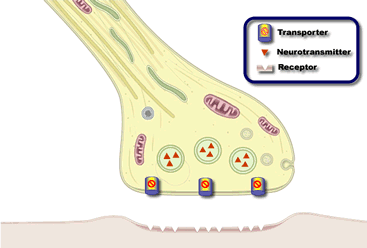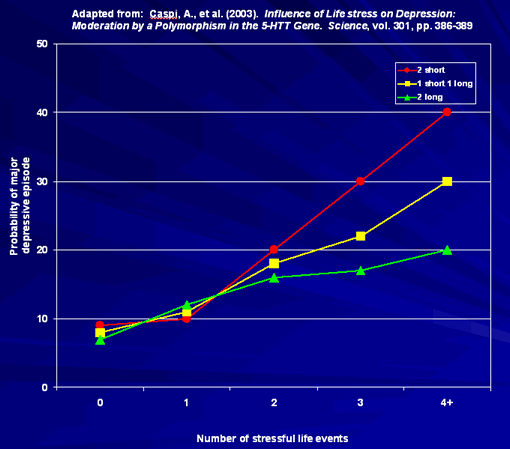In my last entry I hinted at the exciting research results that are emanating from the stress-diathesis model, a model predicting pathology as the combined result of an individual’s vulnerability and stressful life events. One of the reasons for the delay between my last post and this one was my inability to decide what research to choose as an illustration of the stress diathesis model. I finally decided to focus on a wonderful paper published in 2003 by Avshalom Caspi and associates from the Institute of Psychiatry, King’s College, London.
First, let’ set the context: Talk to any researcher specializing in any one psychopathology and ask him/her what environmental event is most strongly associated with the onset or severity of that pathology and the answer will be the same: STRESS. Now, there are two problems associated with this answer: First, not everyone agrees exactly what stress is. Ask 100 scientists (or even lay people) the definition of stress, and you’re likely to get 100 different answers (for what I think is the BEST answer, click on the Center for studies in human stress link under the “some links” section of this page, a little down and to your right). Second, even if we could agree on what stress is, it is clear that a general reference to stress as a trigger for depression would constitute a very poor scientific answer. Why would stress precipitate depression in some people, anxiety in others, and schizophrenia in others? The response of psychologists to this dilemma (and it is supported by some pretty good evidence) is to say that it is stress defined by loss (either of a loved one, of employment, of security) that is most likely to push you over the edge and into depression. But here, too, there is a problem: not everyone who suffers a loss (even a major one) will become depressed. They may mourn, experience sadness and unhappiness, but they won’t experience the dramatic inability to deal with every day life that defines depression (right, Kathy?). The idea that depression is the inevitable consequence to loss is about as satisfying as Tom Cruise’s rants against psychiatry. It also ignores the obvious: people are different, and if they are different it should not surprise us that they can (and do) react differently. In fact, it was on the basis of logic such as this that the stress-diathesis model was developed in the first place.
But then what predicts how people will react to stress? Can we identify the things that make some people sensitive to loss, or those that immunize people against it? Can we identify the variable(s) that prophesize individual differences? These were the general questions that Caspi and his team were interested in answering. They were aware of the literature demonstrating that some people are “genetically” more at risk then others to develop depression. But what genes? For a number of reasons, they decided to focus on one gene, the gene that codes for what is known as the serotonin transporter.
We need here to pause, once more, and consider some basic neurobiology. The cells of our brains (known as neurons) are built for one thing and one thing only: communication. When neurons talk to one another, they do so chemically. More specifically, the neuron that has something to say sends it message by releasing a chemical known as a neurotransmitter. The neurotransmitter molecules travel across a gap known as the synaptic cleft, and then bind to specialized proteins on the next neuron known as receptors. Receptors are like the “ears” of a neuron, when the neurotransmitter binds to them, the neuron receiving the signal knows that a message has actually been sent.
Now for the fun part: Since neurons love to talk, they spend a good deal of their energy making sure they have enough neurotransmitter to communicate. A neuron without enough transmitter is about as happy as your Aunt Bessie (you know, the one who loves to regale you with stories from the good ole’ days) with laryngitis. One way that a neuron can maintain an adequate supply of transmitter is that it recycles the neurotransmitter molecules. Yup, neurons recycle! This reflection is comforting to me on those cold February mornings when I am dragging my blue recycle box out to the curb, trying not to freeze my nether regions!
Recycling (or reuptake as it is known in the neurobiological literature) occurs through the transporter. Think of the transporter as a pump or a vacuum cleaner that pulls the transmitter molecules back into the cell, the cell then protects the molecules with an envelope called a vesicle, and the molecules are now available for use the next time the neuron wants to send a signal. The whole process of neurotransmission and reuptake is illustrated in the cartoon below:

Each transmitter has its own transporter (since you don’t want to be recapturing “foreign” transmitters), and each different transporter is coded for by a different gene. Genes consist of two parts, the coding region, which is the blueprint for how to build a component of the cell (usually a protein), and the promoter region, which controls how much protein to build. If you think of the coding region as the blueprint for how to build a cabinet, the promoter region would be the cabinet maker.
Now, back to Caspi: Serotonin is a neurotransmitter, and we have good reason to suspect that imperfections in the way that serotonin works may be associated with depression. It turns out that the promoter region for the gene that codes for the serotonin transporter comes in two different flavours: a long form and a short form. The short form is like a lazy cabinet maker, it will build the transporter, but it won’t build as many of them as the energetic long form. So, people with fewer serotonin transporters may run the risk of not being able to efficiently sustain sufficient levels of serotonin. This is particularly true under conditions of stress, because serotonin is one of the major transmitters activated during periods of stress.
So, what Caspi and crew did was to genotype about 500 young Brits (between the ages of 21 and 26), and separate them into three groups: people with two copies of the long form of the gene (we each get a copy of all our genes from Mom, and a second copy from Dad), two copies of the short form, and one copy of the long and one copy of the short gene. They followed these young adults over these five years and recorded the number of stressful life events they experience during that time, looking at things such as stressful employment, financial, housing, health and relationship events. At the age of 26, Caspi and his crew evaluated which of these people were clinically depressed. They then plotted the percentage of people who were depressed as a function of genotype and the number of stressful life events they experienced. Have a look below to see what they found.

The first thing to note about this figure is that there is a general trend for depression rates to increase as the number of stressful life events increases. However, the relative rate of increase varies depending on the genotype. If you have two copies of the short gene, then chances are about 40% that you will be depressed if you have experienced four or more stressful events. If you have 2 copies of the long gene, then changes are only about 18% you will become depressed. Of interest, if you have one long and one short gene, the chance that you will become depressed after four or more stressful events falls right in the middle at about 30%.
Note another important point about the figure. Look at the depression rates in people who did not experienced any stress. All three groupd are pretty much the same: about 7-9%. So, by itself, the genotype does not predict depression; it is the combination of genes with (stressful) experience that best determines onset of depression. Or, to follow up on the analogy from my last entry: Having two copies of the short serotonin transporter gene is the vulnerable Achilles heel for depression, but that vulnerability will remain largely dormant unless the arrows of stressful life events expose this “weakness”.
Of course, as promising as these data are, they do leave open a number of questions. How do we explain the 7-9% of people who did not experience stress and yet became depressed? Why did “only” 40% of people with to copies of the short gene become depressed? Serotonin is just one transmitter system that is mobilized by stress, there are many others. So, it is likely that genes coding for other transmitter systems are involved, and these may be differentially responsive to the effects of stress. And so the search continues; which, for scientific explorers such as yours truly, means that we will be gainfully employed for the foreseeable future.
Tagged as depression, gene, neurotransmission, neurotransmitter, stress, stress¸, vulnerability.
Posted in Brain, Mental health.
Posted on 29 Jan 2008
On Jan 29th 2008 at 20:02
My question is how do we know weather we
carry a short gene or long,
Or a mixed bag?
Well written and carry on the research so that
one day the mystery will be solved.
D
On Feb 2nd 2008 at 16:49
Hi Diane:
Molecular biologists have developed many novel ways of measuring how genes you have and do not have, as well as how these genes get expressed. I’d like to say that I could describe these test in detail, but this is an area outside my expertise, and I am afraid that I might not be as accurate as I need ot be.
If you’re interested in these test because you would like to know if you are at risk or not for developing depression, let me reply in two ways. First, there is not much you can do asbout changing your genes, even if you know what they are. If you learn that you have two copies of the short serotonin transporter gene, well, there’s not much you can do about that, other then to try to avoid being put into stressful situations. Which is a nice segue to my second response: You can exert more control over your stress in your life then you can over you genes. True, there are some things that you can’t always manage (a rotten boss or example), but many things can be managed (e.g., a rotten relationship). So, my advice to you is to try to control your stress level: attend to your work and don’t get upset if you efforts don’t get the same level of appreciation as the boss’s second cousin, select good people as friends, avoid jerks, be kind to your loved ones (and demand the same in return), eat well (but don’t feel guilty is you enjoy the occasional hot dog and poutine), excercise (and don’t feel guilty if you miss one or two sessions because you want to watch the latest episode of Lost), don’t fret over the things you can’t control (e.g., 30 cm of snow), and share a glass or two (but no more) of red wine once in a while with that extra-special someone in your life.
You may not know this, but there is good scientific evidence ot support each and everyone of the bits of advice I just offered; comforting, isn’t it, that sience sometimes supports common sense?
On Apr 21st 2008 at 12:19
Hi Joe you should ask to change the photo on your profile…Great topics by the way.
Ray